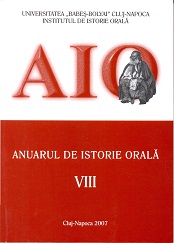CULTURĂ SCRISĂ ŞI TRADIŢII ORALE ÎN COMUNITĂŢILE DE CEHI DIN M-ŢII ALMĂJULUI
Written Culture and Oral Tradition in The Csech Communities of Almajului Mountains
Author(s): Sînziana PredaSubject(s): History
Published by: Argonaut
Summary/Abstract: Being synonym, nowadays, with conservative mentality, tradition enforces and sustains – especially in small communities – living patterns. As “a historical being, the individual tends to understand the significance of existence, its ideals and meanings, being at the same time subordinated to the conduct of ethic patterns, that are imposed by community and axiologically validated”. The frame of these models is constitued by tradition, that induces the circulation of these elements from generation to generation; „the vehicle” that assures their transmission is the orality, specific to restricted communities and where all connection with culture is perpetuated verbal. For fluctuating temporal periods, the process was characteristic for all types of societies, the invention and spreading of writing partially modifying its evolution. Although – at a conceptual level – we distinguish between studying oral tradion and oral history, we took the liberty to think that life stories can be perceived like orality. With other words, we try to identify what people remember and what they orally communicate (to themselves) in time; surely, this is an empirical anthropology, one being interested in how it is said, how the memory is communicated upon what must be done (or what had already happened) in one circumstance or another: the tale about ritual and the ritual of story telling. The analysis of the interviews realized in the Czech communities from the south of Banat region emphasizes the subsequent things: the oral tradition of the new founding existence is the best represented, comparatively with other moments from the collectivities history. All the villagers had perceived those beginnings as being extremely hard, the forefathers being respected and considered as a resistance and virtue model. The materials gathered, based on discussions with the locals, revealed not only a deep interest concerning their ethnical roots, but also the fact that some of the locals made a substantial effort in seeking books and brochures about the pems history, written information difficult to find because of the reduced number of existing documents concerning this community. The proportion between the information passed down orally and the written one, concerning this enclave, proved that for the bems spokers of Czech language, the most important way to transmit and preserve their memory, was and still is fundamentally orally. Traditional culture that is orally passed down prevails the initiatives of down written memory. Though, the last one materializes in few written documents, still it does not minimize the complexity of the Czech culture and civilization. The universe of the Czech villages is partially revealed in what it was written inside this community and partially in traditional culture aspect passed down orally, the remaining characteristic of a society where the memory is always renewed.
Journal: Anuarul Institutului de Istorie Orală
- Issue Year: 2007
- Issue No: VIII
- Page Range: 278-305
- Page Count: 28
- Language: Romanian

